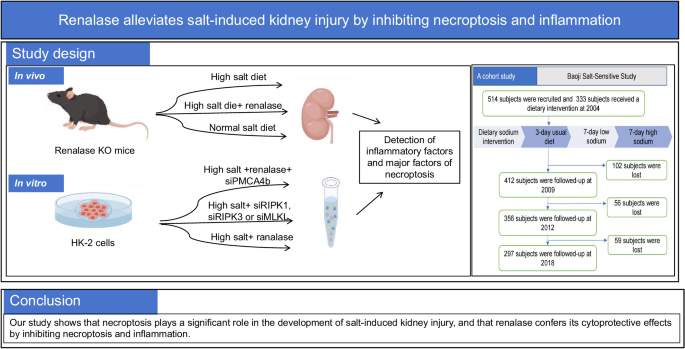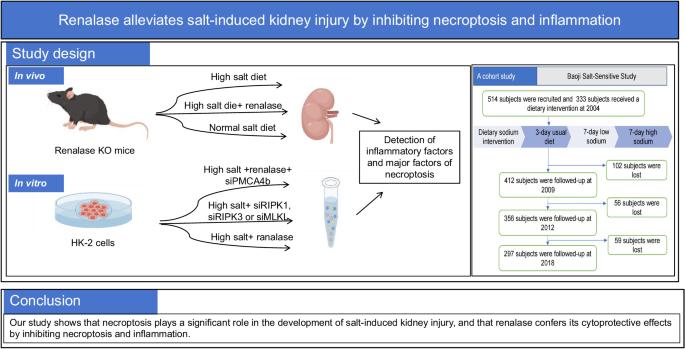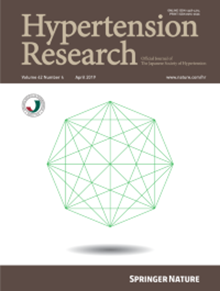肾酶能减轻盐引起的肾坏死和炎症。
IF 4.3
2区 医学
Q1 PERIPHERAL VASCULAR DISEASE
引用次数: 0
摘要
最近的证据表明,坏死细胞增多症可能会导致肾损伤的发生。肾酶是一种新型分泌蛋白,具有强大的促生存和抗炎作用。我们假设肾酶可以通过调节坏死蛋白酶来保护肾脏免受盐引起的损伤。我们对达氏盐敏感(SS)大鼠、肾酶基因敲除(KO)小鼠和 HK-2 细胞进行了高盐和肾酶处理。此外,研究人员还利用514名符合条件的参与者组成的队列,调查了RIPK1、RIPK3和MLKL基因中的单核苷酸多态性(SNPs)与14年内亚临床肾损伤(SRD)风险之间的关联。高盐饮食会明显增加 SS 大鼠坏死关键成分(即 RIPK1、RIPK3 和 MLKL)的表达以及炎症因子的释放。用重组肾酶治疗可减少坏死和炎症。在肾酶 KO 小鼠中,盐诱导的肾损伤比野生型小鼠更严重,但补充肾酶可减轻肾损伤。用HK-2细胞进行的体外实验显示,高盐增加了坏死和炎症。肾酶对盐诱导的坏死有剂量依赖性的降低作用,这种细胞保护作用被肾酶受体 PMCA4b 的敲除所抵消。此外,队列研究显示,RIPK1中的SNP rs3736724和MLKL中的rs11640974与14年内SRD的风险显著相关。我们的分析表明,坏死细胞增多症在盐诱导的肾损伤发展过程中起着重要作用,而肾素酶则通过抑制坏死细胞增多症和炎症发挥细胞保护作用。本文章由计算机程序翻译,如有差异,请以英文原文为准。


Renalase alleviates salt-induced kidney necroptosis and inflammation
Recent evidence suggests that necroptosis may contribute to the development of kidney injury. Renalase is a novel secretory protein that exerts potent prosurvival and anti-inflammatory effects. We hypothesized that renalase could protect the kidney from salt-induced injury by modulating necroptosis. High salt and renalase treatments were administered to Dahl salt-sensitive (SS) rats, renalase knockout (KO) mice, and HK-2 cells. Furthermore, a cohort of 514 eligible participants was utilized to investigate the association between single nucleotide polymorphisms (SNPs) in the genes RIPK1, RIPK3, and MLKL, and the risk of subclinical renal damage (SRD) over 14 years. A high-salt diet significantly increased the expression of key components of necroptosis, namely RIPK1, RIPK3, and MLKL, as well as the release of inflammatory factors in SS rats. Treatment with recombinant renalase reduced both necroptosis and inflammation. In renalase KO mice, salt-induced kidney injury was more severe than in wild-type mice, but supplementation with renalase attenuated the kidney injury. In vitro experiments with HK-2 cells revealed high salt increased necroptosis and inflammation. Renalase exhibited a dose-dependent decrease in salt-induced necroptosis, and this cytoprotective effect was negated by the knockdown of PMCA4b, which is the receptor of renalase. Furthermore, the cohort study showed that SNP rs3736724 in RIPK1 and rs11640974 in MLKL were significantly associated with the risk of SRD over 14 years. Our analysis shows that necroptosis plays a significant role in the development of salt-induced kidney injury and that renalase confers its cytoprotective effects by inhibiting necroptosis and inflammation.
求助全文
通过发布文献求助,成功后即可免费获取论文全文。
去求助
来源期刊

Hypertension Research
医学-外周血管病
CiteScore
7.40
自引率
16.70%
发文量
249
审稿时长
3-8 weeks
期刊介绍:
Hypertension Research is the official publication of the Japanese Society of Hypertension. The journal publishes papers reporting original clinical and experimental research that contribute to the advancement of knowledge in the field of hypertension and related cardiovascular diseases. The journal publishes Review Articles, Articles, Correspondence and Comments.
 求助内容:
求助内容: 应助结果提醒方式:
应助结果提醒方式:


